M6Unit4 task
M6unit4Reading

Cause
1 Peacekeeping War fighting
2 famine
Shortage of food
3 Flooding
Typhoon, hurricane,
tsunami
4 Irrigation
Desertification
5 Illness
Poverty, disasters
6 No running
Skimming
1. Who is Tang Ning? A businesswoman and a Goodwill Ambassador 2. How many countries belong to the UN?
191 countries
3. Which countries has Tang Ning visited?
There are still some problems that can’t be settled by individuals.
Filling in blanks
Picture Problem Cause
1 2 3 4 5 6
Organization
Filling in blanks
Pic Problem
• What is the UN? • What are its main four purposes? • What detailed work does it deal with? • What is a goodwill ambassador of the UN? • What’s the final goal of the UN?
Goals it promises to achieve by 2015
M6_Unit4_Project语言点

n.[C] 人群 vt.&vi. 挤满,塞满,使拥挤 crowd in (on sb.) / into sth (想法、问题等)涌上心头;涌入脑海 crowd out 把…挤出,排挤 1. crowd crowded adj.拥挤的 2. remind sb of …让某人想起…,提醒某人… remind sb. about sth 提醒某人某事 to do sth 提醒某人做某事 that …提醒某人…
2. access n.接近;进入;(接近或进入的)方法/门路 (1)表示“(向场所入口等的)接近,进入;(资料 等的)取得,利用”时, access为不可数名词,后接介 词to (2) 表示“接近的方法/门路;使用…的权利”时, 既可作可数名词,也可作不可数名词 gain/obtain access to… 得以接近/进入/会见 give access to…使能接近… free access to…免费使用…
4.这里的水使伤口难以愈合,也容易传播疾病。 The water makes it difficult for the cuts and wounds to get better and easy for bacteria to spread.
5. A lack of food will be a problem in the future. 食物的缺乏在将来会成为问题.
1. in chaos 处于混乱状态 in a mess 乱糟糟,一团糟
Language points
2. flee to the mountains to escape escape, flee都作“逃跑”。 escape 往往指罪犯逃跑或逃脱了惩罚; flee 强调逃脱的行为不强调成功与否; flee to/into 逃往/进… flee from 从…逃离 The enemy soldiers were fleeing in all directions, but few of them could escape.敌兵四处逃窜, 但很少能逃出去。
M6 U4 Task
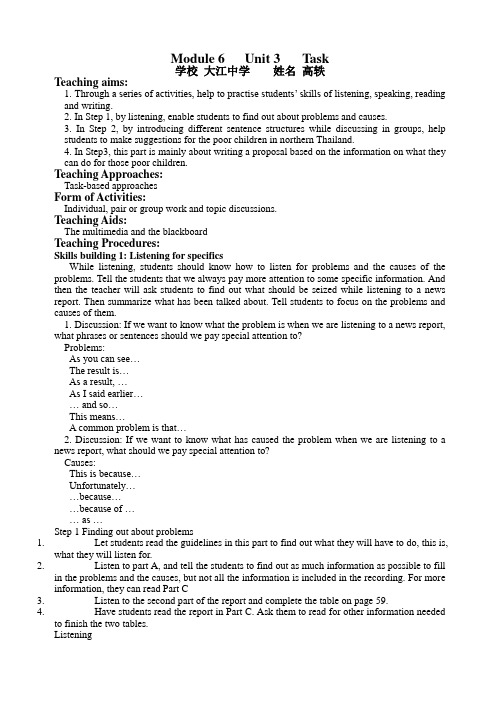
Module 6 Unit 3 Task学校大江中学姓名高轶Teaching aims:1. Through a series of activities, help to practise students’ skills of listening, speaking, readingand writing.2. In Step 1, by listening, enable students to find out about problems and causes.3. In Step 2, by introducing different sentence structures while discussing in groups, helpstudents to make suggestions for the poor children in northern Thailand.4. In Step3, this part is mainly about writing a proposal based on the information on what theycan do for those poor children.Teaching Approaches:Task-based approachesForm of Activities:Individual, pair or group work and topic discussions.Teaching Aids:The multimedia and the blackboardTeaching Procedures:Skills building 1: Listening for specificsWhile listening, students should know how to listen for problems and the causes of the problems. Tell the students that we always pay more attention to some specific information. And then the teacher will ask students to find out what should be seized while listening to a news report. Then summarize what has been talked about. Tell students to focus on the problems and causes of them.1. Discussion: If we want to know what the problem is when we are listening to a news report,what phrases or sentences should we pay special attention to?Problems:As you can see…The result is…As a result, …As I said earlier…… and so…This means…A common problem is that…2. Discussion: If we want to know what has caused the problem when we are listening to anews report, what should we pay special attention to?Causes:This is because…Unfortunately……because……because of …… as …Step 1 Finding out about problems1.Let students read the guidelines in this part to find out what they will have to do, this is,what they will listen for.2.Listen to part A, and tell the students to find out as much information as possible to fillin the problems and the causes, but not all the information is included in the recording. For more information, they can read Part C3.Listen to the second part of the report and complete the table on page 59.4.Have students read the report in Part C. Ask them to read for other information neededto finish the two tables.ListeningAnswers:Part A: (1) no running water(3) no money(4) few clothes or furniture(5) no electricity(6) forest has been cut downPart B: (1) poverty(2) many children, especially girls, do not go to school(4) all farming is done by hand(5) small amount of land and water available(6) children have poor diets(7) children do not grow properly(8) many of the children’s parents have died of AIDS(9) grandparents have to bring up children(10) grandparents are old and poorPart C: A (2) repairing of pumps takes several daysB (3) not enough moneySkills building 2: Discussing in groupsBy introducing different sentence structures while discussing in groups, help students to make suggestions for the poor children in northern Thailand.1.Making suggestionsI think it would be a good idea to…I would like to suggest that…It would be a good idea if we could…1.Asking for opinionsWhat do you think? Does anyone else have any suggestions?Can you suggest anything else?2.Expressing agreement / disagreementI agree / disagree because…That’s a great idea, but…I’m sorry but I don’t think that would work because …Unfortunately, I don’t think that will work.3.Making conclusionsSo to summarize, our group has decided to…In conclusion, we have decided to…Step2: making suggestions1.Have students read the instructions and make sure they know what they are going todo. Divide students into small groups and discuss what other ways they think of to help these children. Ask them to use the sentence structures in Skills building 2 to give suggestions , and express agreement / disagreement.2.While discussing, one group member should take notes, and another member shouldbe chosen to report what has been written to help those poor children.Discussion: What can we do to help the poor children in northern Thailand?We can raise some money for them.donate pocket money.give away some books.give them some clothes.Skills building 3: Composing a proposalHelp students to read the six points in this part. They will learn what components will be included in a proposal. Make sure what students should do when writing a proposal.Step 3. composing a proposalStudents will be asked to write a proposal to UNICEF about how to help the hill tribe children in northern Thailand with the information they have learnt in steps 1 and 2.1.Help students form different groups to discuss the answers based on the previousinformation.2.Have students write the proposal and ask each group to present theirs to let others sharetheir opinions.Possible example:Title: Helping the hill tribe children in northern ThailandGroup members: (Students’ own names)Introduction: We have been researching the problems faced by the children in northern Thailand. There are many villages in northern Thailand where children do not have books. Their classrooms have no roofs. Many girls cannot go to school.Our group would like to help them.Proposal:We would like to help the children by:1. donating the money collected from the students and teachers in our school2. donating English books collected from the students in our school3. donating clothes collected from the students in our schoolWriting a letter to them to tell them that we want to do what we can to help themBenefits: Helping the hill tribe children in northern Thailand to go to school and live a better life.Helping us recognize that there are many people in the world that need help.We would be pleased if you would approve our proposal. If you require any further information, please contact us. Our contact details are: (Students’ school address).Language points:1. face (v.)面对,面向The terrace faces towards the sea/faces south.Their houses face each other across the street.面临问题,(问题等)逼近Passengers could face long delays.This is one of the many problems faced by working mothers.You’re faced with a very difficult choice there.正视(问题)I think Phil has to face the fact that she no longer loves him.We have to face facts here—We simply don’t have enough money.He is dying but he refuses to face the truth.face up to sth. 敢于面对,勇于正视(困难或不快之事)She is going to have to face up to the fact that he’s not going to marry her.face-to-face 面对面We’ve spoken on the phone but never face-to-face.She came face-to-face with the gunman as he strode into the playground.to sb’s face 当着某人的面If you got something to say, say it to my face.in the face of 面对She left home in the face of strong opposition from her parents.高考链接:(1)____________ with so much trouble, we failed to complete the task on time.A. FacedB. FaceC. FacingD. To face(2)____________ with a difficult situation, Arnold decide to ask his boss for advice.A. To faceB. Having facedC. FacedD. FacingAnswers: AC2. break down机器出故障,汽车抛锚Our car broke down and we had to push it off the road.精神崩溃When we gave her the bad news, she broke down and cried.计划等失败break的常用短语:break away 逃脱,脱离(from)break in 强行闯入,打断break into 强行闯入break off 折断;中断,停顿break out 爆发,突然开始break through 突破break up 粉碎;结束;解散,(与某人)分手eg: He grabbed her, but she managed to break away.The burglars broke in through the kitchen window.My car has been broken into twice this month.As she was talking, he suddenly broke in, saying, “That’s a lie.”War broke out in 1914.Fighting has broken out all over the city.He broke off a piece of chocolate.She broke off in the middle of a sentence.Protesters broke through the barriers.She’s just broken up with her boyfriend.We broke up for the holidays in June.高考链接:(1)News reports say peace talks between the two countries _____________ with no agreement reached.A. have broken downB. have broken outC. have broken inD. have broken up (2)The computer system suddenly ______________ while he was searching for information on the Internet.A. broke downB. broke outC. broke upD. broke in(3)I was still sleeping when the fire _____________, and then it spread quickly.A. broke outB. put outC. came outD. got out(4)We’re trying to ring you back, Bryan, but we think we ______________ your number incorrectly.A. looked upB. took downC. worked outD. brought aboutAnswers: AAAB3. means [C] 方法They had no means of communication.We need to find some other means of transportation.We must use every means at our disposal.There is no means of tracing the debt at all.The family had no means of support(= way of getting money).means的常用短语:by all means 当然可以eg: “May I borrow this book?”“By all means.”by no means 决不eg: It is by no means certain that we will finish the project by June.This isn’t the last we will hear of it by any means.by means of 借助…手段,依靠…方法eg: She tried to explain by means of sign language.高考链接:I’ve tried very hard to improve my English. But by no means ____________ with my progress.A. the teacher is not satisfiedB. is the teacher not satisfiedC. the teacher is satisfiedD. is the teacher satisfiedAnswer: DExercises:单项填空1. —We to have you here tonight.—Thank you and it is for me to be invited.A. honor; honorableB. honor; an honorC. are honored; honorableD. are honored; an honor2. Though money, his parents still managed to send him to university.A. lackedB. lacking ofC. lackingD. lacked in3. This event not only promoted of world hunger, but also raised lot of moneyto help starving children.A information B. knowledge C. instruction D. awareness4. If I am not when you phone, ask for my brother.A. availableB. ableC. spareD. busy5. —Do you really want to go out?—It may rain. , I shall go out; I don’t mind the rain.A. AnywayB. OtherwiseC. SomehowD. Somewhat6. They take little interest in a far from their homes and from their everyday problems.A. debate; farB. conflict; remoteC. fight; distantD. discussion; away7. Does it make any whether we leave at 9:00 or at 10:00?A. differenceB. timeC. wayD. sense8. The lock in my bag me of not locking my closet.A. recalledB. rememberedC. remindedD. told9. It’s sparing yourself some time to do physical exercise under such considerable learning pressure.A. very worthB. well worthy ofC. well worthD. much worth10. ___ environmental damage is done, it will take many years for the ecosystem to recover.A. If onlyB. Even ifC. WhileD. Once11. the occasional visit, what else does Alan do for his kids?A. ExceptB. In spite ofC. Apart fromD. Beside12. Good ways of doing things mean saving time, and it is important for us to find them.A. meanwhileB. otherwiseC. howeverD. therefore13. It was foolish of him to his notes during that important test, and as a result, he got punished.A. refer toB. stick toC. come toD. turn to14. As civilization , more and more people have realized the importance of preserving rare animals from extinction.A. stretchesB. expandsC. extendsD. spreads15. Changes are being introduced to make the department .A. operating quicklyB. going quicklyC. operate more efficientlyD. go more efficiently任务型阅读The food we eat seems to have profound effects on our health. Although science has made enormous steps in making food more fit to eat, it has, at the same time, made many foods unfit to eat. Some research has shown that perhaps eighty percent of all human illnesses are related todiet and forty percent of cancer is related to the diet as well, especially cancer of colon. Different cultures are more likely to cause certain different illnesses because of the food that is characteristic in these cultures.That food is related to illnesses is not a new discovery. In 1945, about 60 years ago, government researchers realized that nitrates(硝酸盐), commonly used to preserve color in meats, and other food additives(添加剂), caused cancer. Yet, these additives which cause cancer remain in our food, and it becomes more difficult all the time to know which things on the packaging labels of processed food are helpful or harmful.The additives which we eat are not all so direct. Farmers often give penicillin to beef and living animals, and because of this, penicillin has been found in the milk of treated cows. Sometimes similar drugs are given to animals not for medical purposes, but for financial reasons. The farmers are simply trying to fatten the animals in order to obtain a higher price on the market. Although the Food and Drug Administration (FDA) has tried repeatedly to control theseAnswers:1-5 DCDAA 6-10 BACCD 11-15 CDADC1. Effects/ Influences2. associated/ linked3. cultures4. left5. medical6. treat7. financial8. fatter9. price 10. practices。
2023外研版英语八年级上册M4-M6知识要点学习计划
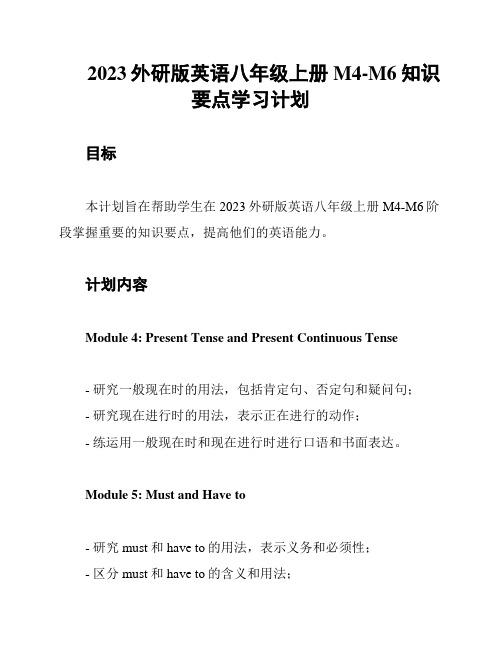
2023外研版英语八年级上册M4-M6知识
要点学习计划
目标
本计划旨在帮助学生在2023外研版英语八年级上册M4-M6阶段掌握重要的知识要点,提高他们的英语能力。
计划内容
Module 4: Present Tense and Present Continuous Tense
- 研究一般现在时的用法,包括肯定句、否定句和疑问句;
- 研究现在进行时的用法,表示正在进行的动作;
- 练运用一般现在时和现在进行时进行口语和书面表达。
Module 5: Must and Have to
- 研究must和have to的用法,表示义务和必须性;
- 区分must和have to的含义和用法;
- 练运用must和have to进行口语和书面表达。
Module 6: Used to and Would
- 研究used to和would的用法,表示惯和过去经常发生的动作;- 区分used to和would的含义和用法;
- 练运用used to和would进行口语和书面表达。
研究方法
- 阅读教材中相关模块的课文和例句;
- 播放听力材料,提高听力理解能力;
- 完成课后练,巩固所学知识;
- 参与口语练,提高口语表达能力;
- 多做阅读和写作练,提高阅读和写作能力。
注意事项
- 每天安排适当的研究时间,不要拖延;
- 与同学一起研究,相互讨论和分享研究经验;
- 遇到困难及时向老师请教,不要放弃。
总结
通过按照该研究计划的内容进行研究,相信学生们能够在2023外研版英语八年级上册M4-M6阶段掌握重要的知识要点,提高他们的英语能力。
祝愿大家研究顺利!。
M6u4含答案(可打印修改)

M6U4 Helping people around the world编者:秦志东审核:李萍Leaning aims:By the end of this period, you will be able to:1.grasp usage of the following key words and phrases: lack, equal, contribute, worthwhile,alternative, means, remind,refer to..2.review the original sentences and paraphrase or exchange important sentence structures;3.write a short passage based on what you have learned this class:Task 1: Key words and phrases1. lack n. & vt. 缺乏①The plant died _____ ______ _____water.②He is good at his job but he seems to ____ __________.翻译句子:由于年轻, 她缺乏经验。
______________________________________________________________________________.They lacked for nothing.______________________________________________________________________________Though ______ money, his parents still managed to send him to university.A. lackedB. lacking ofC. lackingD. lacked in归纳总结:2. equal adj. 平等的; 同等的, 相同的; 胜任的n. 同等的人; 相等物vt. 与……相同或相等, 敌得上→_________(adv. )相等地→__________(n. )同等, 平等①The two books ___ more or less _____ in length.②Three feet __ roughly______ __ one meter.③I’m sure he __ _____ __ the task.④He is a scientist _______ _____, because his achievement isunlikely to be ________.He equals me in strength but not in intelligence.他和我力气相等, 但智力不同。
b6m4——精选推荐
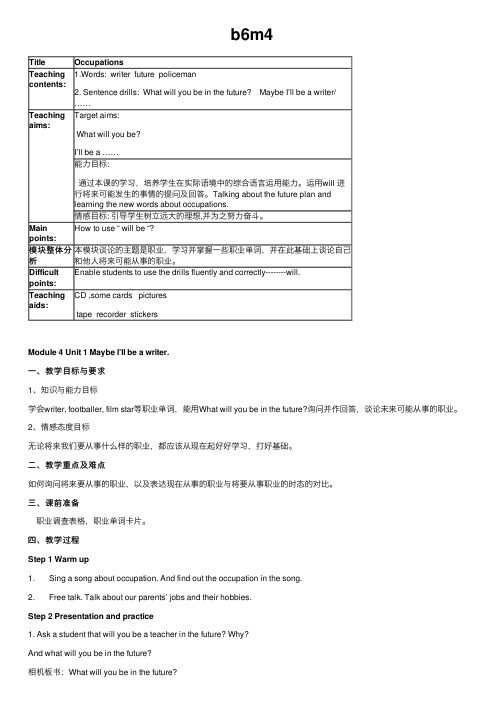
b6m4 Title OccupationsTeaching contents:1.Words: writer future policeman2. Sentence drills: What will you be in the future? Maybe I’ll be a writer/……Teaching aims:Target aims:What will you be?I’ll be a ……能⼒⽬标:通过本课的学习,培养学⽣在实际语境中的综合语⾔运⽤能⼒。
运⽤will 进⾏将来可能发⽣的事情的提问及回答。
Talking about the future plan and learning the new words about occupations.情感⽬标: 引导学⽣树⽴远⼤的理想,并为之努⼒奋⽃。
Mainpoints:How to use “ will be “?模块整体分析本模块谈论的主题是职业,学习并掌握⼀些职业单词,并在此基础上谈论⾃⼰和他⼈将来可能从事的职业。
Difficultpoints:Enable students to use the drills fluently and correctly--------will.Teaching aids:CD ,some cards pictures tape recorder stickersModule 4 Unit 1 Maybe I’ll be a writer.⼀、教学⽬标与要求1、知识与能⼒⽬标学会writer, footballer, film star等职业单词,能⽤What will you be in the future?询问并作回答,谈论未来可能从事的职业。
2、情感态度⽬标⽆论将来我们要从事什么样的职业,都应该从现在起好好学习,打好基础。
⼆、教学重点及难点如何询问将来要从事的职业,以及表达现在从事的职业与将要从事职业的时态的对⽐。
人教版:小学六年级上册英语Unit4~Unit6知识点
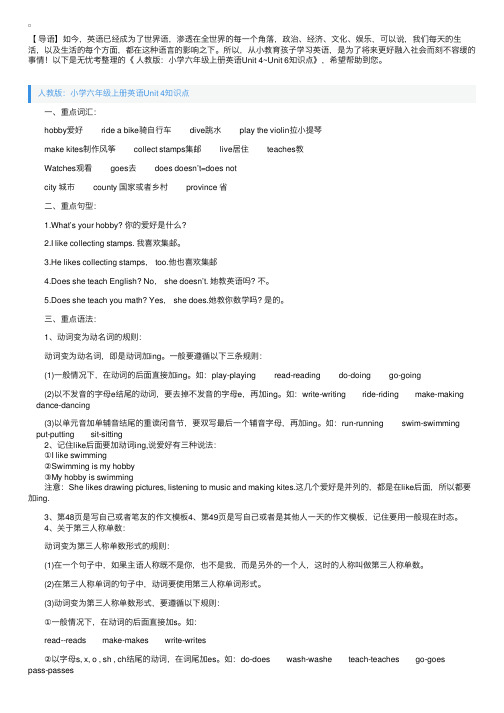
【导语】如今,英语已经成为了世界语,渗透在全世界的每⼀个⾓落,政治、经济、⽂化、娱乐,可以说,我们每天的⽣活,以及⽣活的每个⽅⾯,都在这种语⾔的影响之下。
所以,从⼩教育孩⼦学习英语,是为了将来更好融⼊社会⽽刻不容缓的事情!以下是⽆忧考整理的《⼈教版:⼩学六年级上册英语Unit 4~Unit 6知识点》,希望帮助到您。
⼈教版:⼩学六年级上册英语Unit 4知识点 ⼀、重点词汇: hobby爱好 ride a bike骑⾃⾏车 dive跳⽔ play the violin拉⼩提琴 make kites制作风筝 collect stamps集邮 live居住 teaches教 Watches观看 goes去 does doesn’t=does not city 城市 county 国家或者乡村 province 省 ⼆、重点句型: 1.What’s your hobby? 你的爱好是什么? 2.I like collecting stamps. 我喜欢集邮。
3.He likes collecting stamps, too.他也喜欢集邮 4.Does she teach English? No, she doesn’t. 她教英语吗? 不。
5.Does she teach you math? Yes, she does.她教你数学吗? 是的。
三、重点语法: 1、动词变为动名词的规则: 动词变为动名词,即是动词加ing。
⼀般要遵循以下三条规则: (1)⼀般情况下,在动词的后⾯直接加ing。
如:play-playing read-reading do-doing go-going (2)以不发⾳的字母e结尾的动词,要去掉不发⾳的字母e,再加ing。
如:write-writing ride-riding make-making dance-dancing (3)以单元⾳加单辅⾳结尾的重读闭⾳节,要双写最后⼀个辅⾳字母,再加ing。
外研版八年级英语上册M6单元整体教学设计

外研版八年级英语上册M6单元整体教学设计 设计者(Teacher )课题(Topic )Module 6 Animals in danger教材分析(Analysis of the teaching materials) 单元整体分析(Unit integral analysis):单元主题: Animals in danger该主题属于“人与自然 ”的范畴,涉及“关爱濒危动物,保护环境,保护地球”。
自觉秉承保护动物的理念并主动参与传播保护动物的重要性。
模块内容分析:本模块内容围绕“Animals in danger ”这一主题展开,包括一组参观动物园后的对话,一篇介绍熊猫现状以及政府和WWF 组织的一些保护措施的说明文,一篇课内外语篇重组说明文和多模态语篇,两个关于WorldWildlife Day 的视频与学生的濒危动物海报。
引发学生对于保护熊猫和其他濒危动物的了解和思考。
语篇一是关于Betty 和Lingling 在参观完动物园后引发的关于保护动物的讨论。
整个对话围绕野生动物的生存现状,人类活动对动物及其生存环境的影响以及人们对动物保护措施等内容展开,有助于推动学生践行保护动物的理念。
该语篇传递对于保护动物来说,再小的力量,也是一种支持。
语篇二是一篇说明文。
课文着重介绍了我国大熊猫的数量,生存现状,生活习性以及政府为保护大熊猫采取的行动,号召人们关爱地球上的濒危动物,保护环境,保护地球。
该语篇还进一步向学生介绍了世界自然基金会(WWF )及其存在的重要意义,拓展了学生的视野,丰富了其知识储备。
有助于学生形成良好的保护环境,保护动物的意识。
语篇三是三篇与课文类似的延伸说明文。
介绍了包括华南虎,鲸鱼,企鹅等动物的现状以及其生存环境,最后提出了如何保护野生动物的方案和建议。
该语篇拓展了不同动物面临濒危的困境,突出了人类如何伸出援手拯救动物这一主题内容,有助于进一步使学生感悟保护动物的必要性和逼迫性,获得积极参与行动起来的情感体验,形成人与动物和平相处的价值追求。
M6U4-task
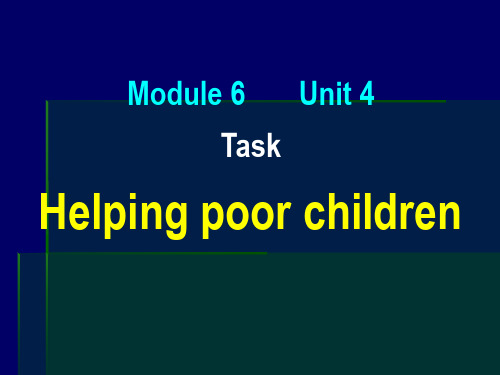
POVERTY
Children don’t (7)__ do not eat
Healt Cannot concentrate enough meat.
h / on learning
Healt Many of the
no doctors or
h care children’s parents nurses and no
difficult to raise animals
Not (3) __________
no money for equipment
Small amount of (5) _____ available
Food/ Children have Diet (6)___________
lack of meat and fresh water
making suggestions: I think it would be a good idea to... We could help by... I would like to suggest that … It would be a good idea if we could…
have (8) __________ money to pay
them
POVERTY
Grandparents have to (9)___________
Family bring up children is difficult
Parents died of AIDS
Grandparents are (10) _________
Part A
Key Problems points
Causes
Water
need to be collected from river
M6U4project

6. It reminded me of my time in Sudan, where several Doctors without Borders staff were attacked as people tried to get the food. e.g. ①下个星期请提醒我回复那封信。 Please remind me to reply to the letter next week. __________________________________________ ②那张古老的Байду номын сангаас片使他想起他和他妻子在农村一起度 过的幸福时光。
My job is not limited to being a teacher. It is also being a person who can listen to and comfort students. _____________________________________________
2.The situation is very different here, as are the problems. 解析:as = so 引导倒装句。 C e.g. Mathematics is very important to me, ______ is English. A. that B. therefore C. as D. such 3. Instead of sand blowing everywhere, there is mud and water everywhere, making it difficult to travel from place to place. 解析: 动名词复合结构 1)sand blowing everywhere 结构为______________. 2)make it +形容词/名词+ to do / that+clause e.g. ①The water makes it difficult for the cuts and wounds to get better and easy for bacteria to spread.
M6U4单元重点单词短语

M6 U4 helping each other (Revision outline)1.for/through lack of 缺少there is a lack of …缺少lack sth缺少be lacking in=be short of 缺少2. refer to ①谈及,提到②与…有关,涉及到③查阅,参考④refer to… as 把…看成refer to…as 认为…是… = look on … as = think of …asfor reference 仅供参考in reference to 关于,根据refer to the dictionary = look up sth in the dictionary=consult the dictionary3.be worth (doing) sth (主动表示被动)be worthy of being done/to be done/sth It is worthwhile to do sth/doing stha crime worthy of the death penalty 应处以死刑的犯罪be worthy of praise = be worthy to be praised=be worthy of being praiseda worthy gentleman 受人敬仰的绅士4. in addition (to sth) = apart from sth = aside from sth= besides sth5. be equal to ①等于②与…相等③胜任=be qualified forbe equal in 在…方面相同/相等equal rights 平等的权利equal v. ①等于②比得上,与…相媲美=match=compare with6.draw one’s attention to 使(某人)注意到,觉察到7.contribute to ①有助于②导致contribute … to ①投稿②捐赠③投入(时间,精力)make contribution(s) to对…作出贡献,助益8. expand ①膨胀,鼓起②(尺码,规模,数量,业务)扩大,扩建The companyexpanded into a large enterprise. ③更详细地阐述,评述expand on/upon sth He expanded on his own theory.9. under the umbrella of ①在…保护之下②在…管理之下10. have no alternative/choice but to do sth 除了…之外别无选择have the alternative of doing sth 有做某事的选择11.if only (但愿,要是…就好了)用于虚拟语气If only I had listened to my parents then!If only one had an unlimited supply of money!If only the rain would stop tomorrow!only if (如果,只有在…时候,唯一的条件是) 不用于虚拟语气12. in possession of 占有,控制in the possession of 被占有,在…控制之下have/take possession of 拥有,占有be possessed by 拥有13. means 手段(单复数同形)by this means=(in) this way 用这种方法by all means 当然可以,没有问题by means of 用…方法,凭借某种手段by no means 绝不,一点也不14.break away from ①逃走,逃脱②背弃,叛离break up ①(关系)破裂,离婚,分手②驱散人群③放假break off 折断break in ①强行闯入②打断,插话break into 闯进,侵入break out ( 战争,疾病,自然灾害)突然爆发break down ①vt 毁坏,镇压,分解②vi. (机器,车辆)坏了,出故障③vi.(计划,谈判)受挫,失败④(身体,精神)跨了12.make a commitment (to sb) (向某人)承诺,保证be committed to ①致力于②忠心于commit ①做(错事或者非法的事),犯罪commit suicide/murder/a crime②承诺保证commit sb/oneself to doing sthcommitted ①坚定的,坚信的= firm = determined a committed expression②尽心尽职的,忠心的be committed to13. in chaos = in a mess 处于混乱状态14. remind sb of sth = remind sth to sb 让某人想起某事,提醒某人某事15. get/catch hold of 得到,抓住get away with逃脱惩罚get rid of 除去;摆脱get in 收获;插话get along with 进展,相处get down to sth/doing sth 着手做某事= set about doing sth=set out to do sth16. promote ①促进,提高②宣传③晋升promote sb to +n(职位) 提拔某人做17. fall victim to 成为…的牺牲品18. volunteer to do sth 自愿去做某事,主动请求去做某事19. acquire ①习得,学会(知识,技能)acquire a good knowledge of②获得,得到get/gain/obtain/achieve reputation/respect20.fetch ①去取来,去拿来②要价21. remote ①(距离上)偏远的,偏僻的,远程的②(时间上)久远的the remote past③(关系上)疏远的22. can’t afford sth/to buy sth ①买得起,付得起②有能力去做;承担得起23. flee fled fled flee (from) sb/sth 逃离flee to sp 逃到某地escape ①逃走②被忘掉,被忽视Her name escapes me = I can’t remember her name.24. touch the lives of people 触及人们生活的每一个方面25. develop friendly relationships 建立友谊26. out of work/job失业27. be decorated with 用…来装饰28. get the project going 使这个项目启动起来29. have no way of making an income 没有赚取收入的方法30. a constant problem 一个长期的问题31. They are of different ages 他们属于不同的年龄段32. farm the land 耕田33. put on weight=gain weight 增肥34. remind sb of ①提醒②使某人想起35. be limited to (介词) 被局限在36. think back to 回想,回顾37. from another angle 从另一个角度38. make a difference (to sth)对…有作用,有影响。
高中英语:复习归纳 M6 U4
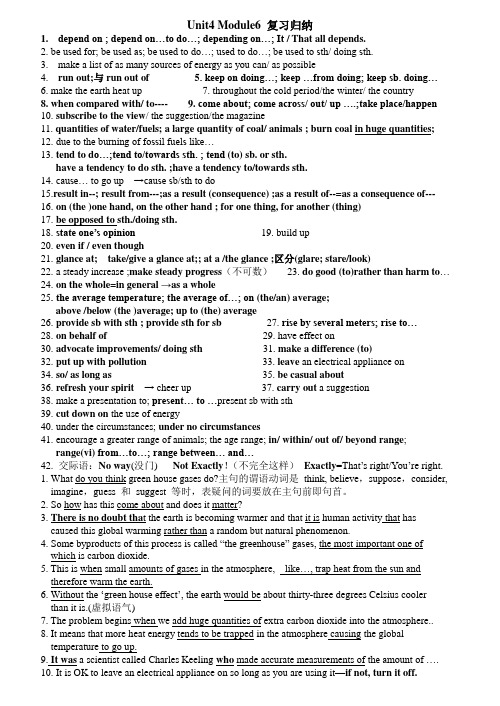
Unit4 Module6 复习归纳1.depend on ; depend on…to do…; depending on…; It / That all depends.2. be used for; be used as; be used to do…; used to do…; be used to sth/ doing sth.3.make a list of as many sources of energy as you can/ as possible4.run out;与run out of5. keep on doing…; keep …from doing; keep sb. doing…6. make the earth heat up7. throughout the cold period/the winter/ the country8. when compared with/ to---- 9. come about; come across/ out/ up ….;take place/happen10. subscribe to the view/ the suggestion/the magazine11. quantities of water/fuels; a large quantity of coal/ animals ; burn coal in huge quantities;12. due to the burning of fossil fuels like…13. tend to d o…;tend to/towards sth. ; tend (to) sb. or sth.have a tendency to do sth. ;have a tendency to/towards sth.14. cause… to go up →cause sb/sth to do15.result in--; result from---;as a result (consequence) ;as a result of--=as a consequence of---16. on (the )one hand, on the other hand ; for one thing, for another (thing)17. be opposed to sth./doing sth.18. state one’s opinion 19. build up20. even if / even though21. glance at; take/give a glance at;; at a /the glance ;区分(glare; stare/look)22. a steady increase ;make steady progress(不可数)23. do good (to)rather than harm to…24. on the whole=in general →as a whole25. the average temperature; the average of…; on (the/an) average;above /below (the )average; up to (the) average26. provide sb with sth ; provide sth for sb27. rise by several meters; rise to…28. on behalf of 29. have effect on30. advocate improvements/ doing sth31. make a difference (to)32. put up with pollution33. leave an electrical appliance on34. so/ as long as 35. be casual about36. refresh your spirit→ cheer up 37. carry out a suggestion38. make a presentation to;present… to …present sb with sth39. cut down on the use of energy40. under the circumstances; under no circumstances41. encourage a greater range of animals; the age range; in/ within/ out of/ beyond range;range(vi) from…to…; range between… and…42. 交际语:No way(没门) Not Exactly!(不完全这样)Exactly=That’s right/You’re right.1.What do you think green house gases do?主句的谓语动词是think, believe,suppose,consider, imagine,guess 和suggest 等时,表疑问的词要放在主句前即句首。
高中英语:M6U4单元测试 答案
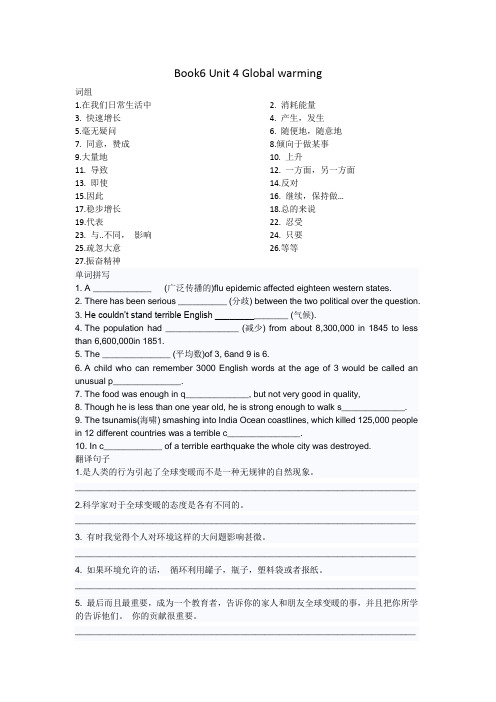
Book6 Unit 4 Global warming词组1.在我们日常生活中2. 消耗能量3. 快速增长4. 产生,发生5.毫无疑问6. 随便地,随意地7. 同意,赞成8.倾向于做某事9.大量地10. 上升11. 导致12. 一方面,另一方面13. 即使14.反对15.因此16. 继续,保持做…17.稳步增长18.总的来说19.代表22. 忍受23. 与..不同,影响24. 只要25.疏忽大意26.等等27.振奋精神单词拼写1. A ____________ (广泛传播的)flu epidemic affected eighteen western states.2. There has been serious __________ (分歧) between the two political over the question.3. He couldn’t stand terrible English _______________ (气候).4. The population had _______________ (减少) from about 8,300,000 in 1845 to less than 6,600,000in 1851.5. The ______________ (平均数)of 3, 6and 9 is6.6. A child who can remember 3000 English words at the age of 3 would be called an unusual p______________.7. The food was enough in q_____________, but not very good in quality,8. Though he is less than one year old, he is strong enough to walk s_____________.9. The tsunamis(海啸) smashing into India Ocean coastlines, which killed 125,000 people in 12 different countries was a terrible c_______________.10. In c____________ of a terrible earthquake the whole city was destroyed.翻译句子1.是人类的行为引起了全球变暖而不是一种无规律的自然现象。
M6 unit4学案
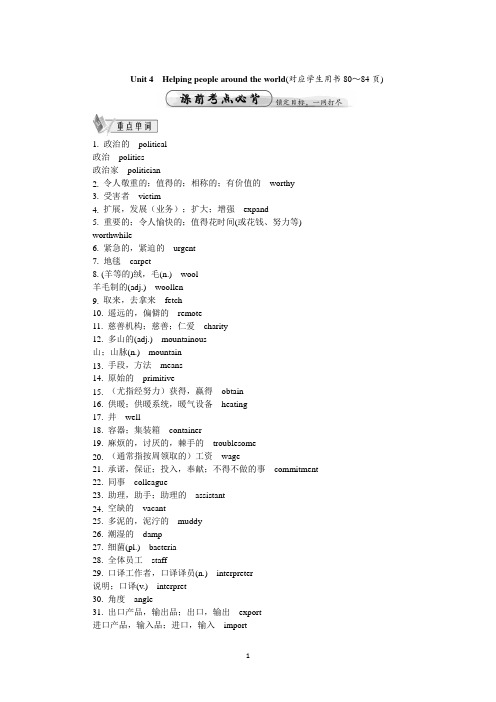
Unit 4Helping people around the world(对应学生用书80~84页)1. 政治的political政治politics政治家politician2. 令人敬重的;值得的;相称的;有价值的worthy3. 受害者victim4. 扩展,发展(业务);扩大;增强expand5. 重要的;令人愉快的;值得花时间(或花钱、努力等)worthwhile6. 紧急的,紧迫的urgent7. 地毯carpet8. (羊等的)绒,毛(n.)wool羊毛制的(adj.)woollen9. 取来,去拿来fetch10. 遥远的,偏僻的remote11. 慈善机构;慈善;仁爱charity12. 多山的(adj.)mountainous山;山脉(n.)mountain13. 手段,方法means14. 原始的primitive15. (尤指经努力)获得,赢得obtain16. 供暖;供暖系统,暖气设备heating17. 井well18. 容器;集装箱container19. 麻烦的,讨厌的,棘手的troublesome20. (通常指按周领取的)工资wage21. 承诺,保证;投入,奉献;不得不做的事commitment22. 同事colleague23. 助理,助手;助理的assistant24. 空缺的vacant25. 多泥的,泥泞的muddy26. 潮湿的damp27. 细菌(pl.)bacteria28. 全体员工staff29. 口译工作者,口译译员(n.)interpreter说明;口译(v.)interpret30. 角度angle31. 出口产品,输出品;出口,输出export进口产品,输入品;进口,输入import1. 缺乏经验lack experience=be lacking in experience由于缺乏……through/for/ because of lack of…2. 自来水running water3. 谈及,提到;涉及;查阅,参考refer to被称作be referred to as…将……送交给refer sb./sth. to…谈及、提到某事make a reference to sth.一本参考书 a reference book介绍信,推荐信reference介绍人,推荐人referee4. 亲善大使 a Goodwill Ambassador5. 生动地描述give a vivid description of=describe sth. vividly难以形容,无法形容beyond description6. 除……之外(还),此外in addition=additionally 除……之外还有……in addition to…附加的,额外的(adj.)additional7. 和……相等;能胜任做某事be equal to sth./doing sth. 平等的权利equal rights社会平等social equality比得上,敌得过equal sb./sth. in sth.同样地,相同程度地equally8. 担任志愿者work as a volunteer志愿做某事volunteer to do sth.做志愿工作do voluntary work9. 使(某人)觉察到draw one's attention to注意pay/give attention to吸引某人的注意attract/catch one's attention吸引住某人的注意力hold one's attention10. 促成,导致;有助于contribute to把……捐给;把……投稿给contribute…to11. 获得知识、技能acquire knowledge/skills12. 在……的保护下,在……的管理下under the umbrella of一把雨伞an umbrella13. 死于饥饿die of starvation=die of hunger=starve to death14. 开水boiled water正在烧开的水boiling water15. 除了做某事别无选择have no alternative/choice/option but to do可供替代的能源alternative energy sources16. 但愿……if only+从句(虚拟语气)17. 拥有in possession of=take possession of=possess=be possessed of被……拥有in the possession of…私人财物personal possessions18. 生活在贫穷中live in poverty生活在贫困线下live under the poverty line19.出故障;抛锚;(计划等)失败;(身体)垮了;分解;破坏break down20. 处在混乱状态in chaos21. 得到,抓住get hold of22. 避雨find/take/seek shelter from the rain保护某人免受shelter sb. from=protect sb. from衣食住行food,clothing,shelter and transportation23. 一大群人 a large crowd of people挤满了be crowded with将……塞入crowd…into24. 让人想起……;提醒某人……remind sb. of sth./sb. to do/that从句告知某人某事inform sb. of sth.抢走某人某物rob sb. of sth.治愈(某人的疾病)/改正(某人的不良行为)cure sb. of sth.警告某人注意某事warn sb. of sth.使某人摆脱rid sb. of sth.25. 一个……的障碍 a barrier to sth.A和B之间的分界线 a barrier between A and B26. 回想think back to=look back on27. 有作用(关系、影响)make a difference (to sb./sth.)没有/几乎没有/有很大/有些影响make no/little/much/some difference28. 触及人们的生活touch the lives of people29. 代表某人on behalf of sb.=on sb.'s behalf30. 自费at one's own expense以……为代价at the cost/expense/price of31. 从一地到另一地from place to place32. 给某人打针give sb. a shot33. 承担(责任),担当;呈现;雇用(某人);接纳take on34. 面临着be faced with=face1. 我很高兴今天有机会跟大家谈谈联合国,联合国也叫UN——这个名称更常用。
M6-U4theUN-bring...
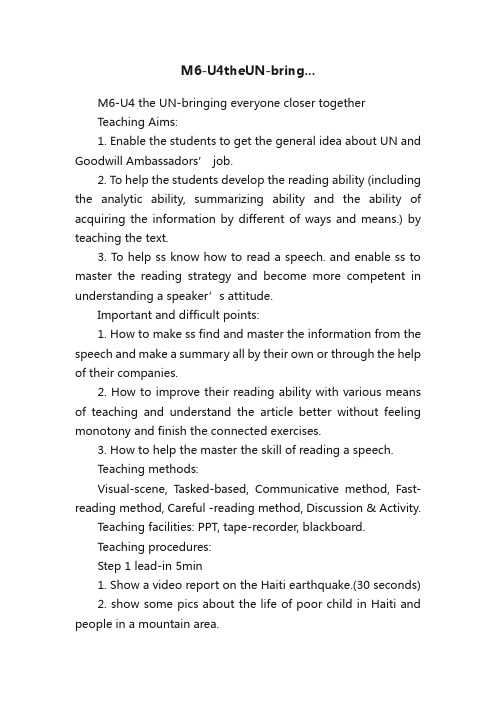
M6-U4theUN-bring...M6-U4 the UN-bringing everyone closer togetherTeaching Aims:1. Enable the students to get the general idea about UN and Goodwill Ambassadors’ job.2. To help the students develop the reading ability (including the analytic ability, summarizing ability and the ability of acquiring the information by different of ways and means.) by teaching the text.3. To help ss know how to read a speech. and enable ss to master the reading strategy and become more competent in understanding a speaker’s attitude.Important and difficult points:1. How to make ss find and master the information from the speech and make a summary all by their own or through the help of their companies.2. How to improve their reading ability with various means of teaching and understand the article better without feeling monotony and finish the connected exercises.3. How to help the master the skill of reading a speech.Teaching methods:Visual-scene, Tasked-based, Communicative method, Fast-reading method, Careful -reading method, Discussion & Activity.Teaching facilities: PPT, tape-recorder, blackboard.Teaching procedures:Step 1 lead-in 5min1. Show a video report on the Haiti earthquake.(30 seconds)2. show some pics about the life of poor child in Haiti and people in a mountain area.Brainstorm: a. what cause these children in such a bad living condition?(Encourage ss to express their feelings after watching the video and the pics.)b. Q: what kind of organization can help them? (Answer: UN)c. Ask ss to tell some information they know about UN.(show some pics to teach the common knowledge on UN )3.Make a summary and Lead the text:Purpose:1. Play a video and show pics to arouse ss’ interests, and collect their attention on the class.2. Encourage ss to express their minds using their own words.Step-2: Fast-reading:During this process: Ask students to skim the text and work out the structure to find out the main idea of the paragraphs and then finish the exercise A.Ask students find out which paragraphs talk about the UN; which paragraphs talk about her work as a UN Goodwill Ambassador.Purpose:1. help ss get the gist of the passage quickly.2. Through the working out the structure, help ss understand the passage better and get in my lesson easier.Step-3 Reading strategy: reading an interview.Have the students listen to the first paragraph and take down some notes about the following two questions. lead ss to pay more attention to catch the key sentence in the first paragraph.1) What is Tang Ning talking about in her speech?2) What do you think Tang Ning thinks of her job?Then, tell ss to read the reading strategy: understanding aspeaker’s attitude.(learn the way ofreading strategy in this unit)Purpose:1. Enable ss to get the basic characteristics of the speech.2. help ss get the gist of author’s attitude to his work by some adjective in paragraph one.3. lead to the reading strategy and make the complementarity of understanding a spe aker’s attitude.(check if ss have missed sth.)4. help ss get the gist of this speech by catching the key sentences.Step-4 careful reading1. Have students read P1, 2, 5 and list the topics of the UN mentioned in these paragraphs with partners.请学生对有关联合国信息的段落进行仔细阅读,通过互助学习找出并进行归纳写下有关联合国的信息。
M6 Unit 4 words(一)
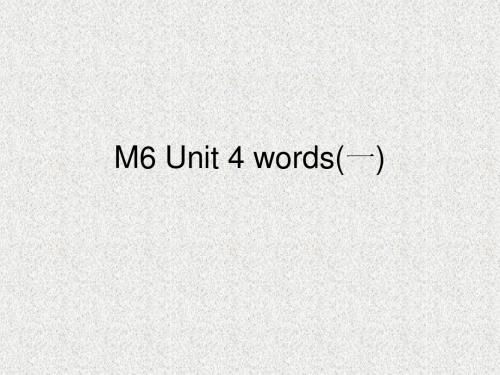
• 3. honor n.. 荣誉,关荣,尊敬; • feel it an honor to do
• 被邀请参加这个晚会,他感到很荣幸。
• He felt it an honor to have been invited to the ________________________________________________
8. peacekeeping / operation / conflict (课文句子) 这个组织参与维和行动,协助终止世界上 一些最恐怖的冲突。 The organization is involved in peacekeeping operation to help end some of the world’s most horrible conflicts. 9. 用 worth/worthy/worthwhile翻译 这本书值得一读。 The book is worth reading. _____________________________ The book is worthy to be read. _____________________________ The book is worthy of being read. ________________________________________ It is worthwhile to read the book. ________________________________________
(课文短语) 触及世界各地人们的生活 Touch the lives of people everywhere
涉及环保问题
touch the problem of environmental protection
M6柯林斯词典U4

M6U41. consume/kənsum/ ( consumes, consuming, consumed )1. V-T If you consume something, you eat or drink it. 吃; 喝[FORMAL]例:Martha would consume nearly a pound of cheese per day.玛莎那时每天吃将近一磅奶酪。
2. V-T To consume an amount of fuel, energy, or time means to use it up. 消耗例:Some of the most efficient refrigerators consume 70 percent less electricity than traditional models.一些能效最高的冰箱比传统型号少消耗70%的电。
consuming /kənsumɪŋ/1. ADJ A consuming passion or interest is more important to you than anything else. 强烈的例:He has developed a consuming passion for chess.他对国际象棋已经产生了浓厚的兴趣。
2. renewable/rɪnuəbəl/1. ADJ Renewable resources are natural ones such as wind, water, and sunlight which are always available. (资源) 可再生的例:...renewable energy sources.…可再生能源。
2. ADJ If a contract or agreement is renewable, it can be extended when it reaches the end of a fixed period of time. (合同、协议) 可延长有效期的例:A formal contract is signed which is renewable annually.签署的一份正式合同每年可续签一次。
- 1、下载文档前请自行甄别文档内容的完整性,平台不提供额外的编辑、内容补充、找答案等附加服务。
- 2、"仅部分预览"的文档,不可在线预览部分如存在完整性等问题,可反馈申请退款(可完整预览的文档不适用该条件!)。
- 3、如文档侵犯您的权益,请联系客服反馈,我们会尽快为您处理(人工客服工作时间:9:00-18:30)。
As you can see, the families here are in very poor conditions. There is no running water and no electricity in this village. Water has to be collected from the river ten minutes’ walk away. This may seem near, but, when you need water for many things, walking ten minutes is a long time. The water then needs to be boiled before it can be used. The result of not boiling the water is illness. As you can see, the villagers’ houses are built of wood and are not very strong. This is because they have no money and cannot get any other materials. The people have very few things like clothes or furniture, because they have no money and there are a long way from the nearest town. There is a bus, but you have to walk six kilometers to get to the nearest road. As I said earlier, there is no electricity in this village, so when it is dark, the only light comes from the small fires that the family cooks over. Unfortunately , much of the forest around the village has been cut down, so the villagers have to walk further and further away from the village to get wood. This also means that drinking water may not be boiled for long enough as there is very little wood. This is going to be a big problem in the future.
houses
Possessions few things like furniture or clothes ___________________ 个人财产
As I said earlier, there is no electricity in this village, so when it is dark, the only light comes from the small fires that the family cooks over. Unfortunately , much of the forest around the village has been cut down, so the villagers have to walk further and further away from the village to get wood. This also means that drinking water may not be boiled for long enough as there is very little wood. This is going to be a big problem in the future.
Unit
4
Task 1
Helping Poor Children
poverty
Poor children in Northern Tailand
As you can see, the villagers’ houses are built of wood and are not very strong.
Key points
Light Wood for fes 原因 No lights, except from small fire family electricity no _________________ cooks over Need to walk further and forest has been further away from village Cut down ___________________
Raise Animal Available
饲养, 饲养,抚养 动物 可饮用的
Poor
贫穷
Roof 屋顶 Chair 椅子
地板, Floor 地板,地面
Fresh water 纯净水 Poor diets 饮食差 Meat 肉 Concentrate on
集中精力做 某事
Grandparents Farming 农活 Equipment
homework Do part C1 on page 125
Thanks for your attending Bye!
工具,农具, 工具,农具, 设备
爷爷奶奶
Listening for problems and causes on part B on page 59
B
1) poverty 9) bring up children 2) go to school 10) old and poor 3) enough money 4) by hand 5) land and water 6) poor diets 7) grow properly 8) died of AIDS
Key points
break down 出故障,抛锚 出故障, troublesome 麻烦的,讨厌的,棘手的 麻烦的,讨厌的, wage (通常指按周领的)工资 通常指按周领的) suggestion 建议 观点, opinion 观点,看法 ask for 询问 要求,请求 询问,要求 要求, agree 同意 disagree 不同意 in summary 总之,归纳起来 总之, in conclusion 总而言之
Key points problems 问题 built of wood, not strong Causes 原因 money no _________________
1. no money 2.a long way from nearest town 3. have to walk six kilometres to catch bus
Problems :
As you can see… The result is … As a result, … As I said earlier… This means … A common problem is that… Another problem is that…
Causes :
This is because … Unfortunately … Because … Because of …
As you can see, the families living here are in very poor conditions. There is no running water and no electricity in this village.
The people have very few things like clothes or furniture, because they have no money.
Key points
个人财产,拥有, Possession 个人财产,拥有,具有 Mountainous 多山的 Poverty 贫穷,贫困 贫穷, Means 手段,方法 手段, Primitive 原始的 Obtain (尤指经努力)获得,赢得 尤指经努力)获得, Heating 供暖,供暖系统,暖气设备 供暖,供暖系统, Well 水井 container 容器, 容器,集装箱
Key points
problems 问题 need to be collected from river
Causes 原因 running water no _________________
Water
As you can see, the villagers’ houses are built of wood and are not very strong. This is because they have no money and cannot get any other materials. The people have very few things like clothes or furniture, because they have no money and there are a long way from the nearest town. There is a bus, but you have to walk six kilometers to get to the nearest road.
As you can see, the families here are in very poor conditions. There is no running water and no electricity in this village. Water has to be collected from the river ten minutes’ walk away. This may seem near, but, when you need water for many things, walking ten minutes is a long time. The water then needs to be boiled before it can be used. The result of not boiling the water is illness.
